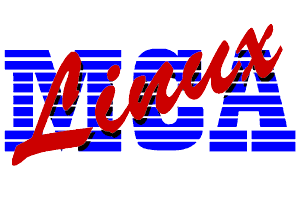
Micro Channel, MCA abbreviated, is one of IBM developed interfaces, which was relatively fast and found mainly use in industrial computers.
IBM implemented this interface in some laptops too.
These computers have often ESDI, SCSI or both types of controllers on board.
With "normal" operating systems none will get problems with these computers, but with linux that is not so simple!
Linux is a "free" operating system, which was developed by Linus Torvalds on base of a unix similar structure for xf86-based computers. Meanwhile
there are ports for Alpha, SPARC, PowerPC, etc. Since also MCA computers were not meant even for the normal user, the linux support was still in
the start holes.
The first place is the MCA Linux Site of Chris Beaureguard. There are kernel patches, boot images etc. for all possible MCA models. Meanwhile some distributions like Debian or Suse offer the necessary MCA and ESDI support.
I had the first contact with MCA with an old IBM PS/2 76i, which was equipped with a SCSI-controller from Future Domain. At this time I tried to install Debian 1.3.1, but machine hangs at boot time. Time to search the WWW and I found Peter Wendt's pages and the link to the MCA linux site.
The installation ran then with the special boot images of Debian 1.3.1 and prompt-append fdomain=0x140,5,ibm (IRQ and IO see SCSI-controller settings) with no problem.
In April 2000 I installed linux on a ThinkPad 700 ; here you may have some problems with the floppy drive and ESDI. Additionally I had only 4MB RAM, which is not favourable for a normal installation.
The problem is to deal with the compilation MCA and ESDI ! Although MCA and ESDI are supported in linux kernel, this is missing on the installation disks. Even fdisk -l don't recognize any ESDI drives; also lilo operates wrong.
I use again Debian 1.3.1, because this distribution is based on the small libc5 libraries. But the boot-disks did not work! On the MCA Linux page you will find some statements how to hack install procedure ( Debian-Installation ), but after first reboot, machine hangs with error "superblock not found". You may try some rescue disks to run efsck.
I found this bootdisk for Debian 1.2 on the MCA Linux server; they work with Debian 1.3.1 too. There are also patches for fdisk and lilo.
You should read the helpfiles under F1 to F10 when starting; there are several appends for boot-prompt!
The lowmem installation starts immediately with the well-known Debian menue and /dev/eda is detected :)) If everything goes on, you should do not forget to activate "X - installation with MCA and ESDI". Modul configuration does not run, seems that script is missing, but don't worry.
After first restart you should consider the kernel messages, there occurs something like /dev/edb. If you have only one harddisk, then
open a second shell and delete this with rm /dev/edb*. The patch is apparently a bit corrupted...
After that you should compile your own kernel (2.2.x or higher) and install modules again.
Meanwhile the problems (bug: # 62623) of the installation disks with ESDI and fdisk should be fixed in Debian "potato"; you can also use the current glibc libraries.
With 4MB RAM or more you can install Xwindows; try mini-X or MGR. Unfortunately I did not bring MGR to run yet. : (
The TP 700 will make here your life not easy too. The LCD display work with dualscan and of whatever reasons xf86config has problems to find a working resolution. First a WD90C2x videochip is installed, then VRAM is not detected correctly and last you get a double view.
You need tp_dualscan from M. Steiner to fix VRAM problem. At my TP is a WD90C26 working, which operates in XF86Config as WD90C30 with a resolution of 640x480 at 100Hz. Well, you get a double view by returning to console.
But it works....
